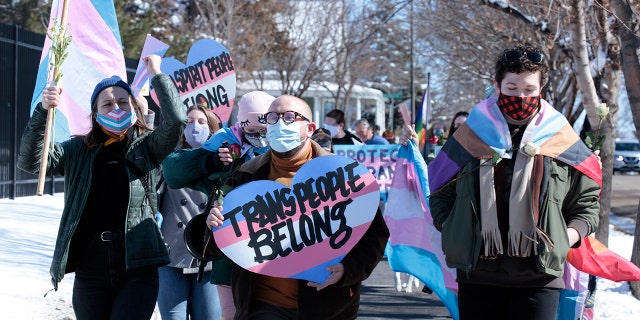A “juggernaut” push by transgender-rights activists may lead to watered-down federal protections for women’s rights, some critics say, as an emotional debate continues over transgender athletes competing in women’s sports.
Some argue that looping in transgender individuals into Title IX protections may contribute to women being left at a competitive disadvantage not only in school sports but long after graduation.
“We actually know that 92% of female executives have played competitive sports in high school or college, so there’s a direct linkage between athletic performance, athletic opportunity and future success later in life,” said Sarah Parshall Perry, a senior legal fellow in the Edwin Meese III Center for Legal and Judicial Studies at the Heritage Foundation.
States have waded into the debate with legislation that has sparked contentious debate and legal arguments that could be headed to the U.S. Supreme Court, experts said.
Perry, who said she worked extensively under the Trump administration on clarifications to Title IX, said she is now working to stop the Biden administration’s proposed “myriad changes” to the 1972 law, which bans sex-based discrimination in schools that get federal funding.
FEDERAL COURT REJECTS CHALLENGE FROM FEMALE ATHLETES TO CONNECTICUT TRANSGENDER SPORTS POLICY
Eighteen GOP-controlled states have banned transgender student-athletes from participating on the teams that align with their gender identity.
(AP Photo/Samuel Metz, File)
She called it a “a stunning act of hubris” that President Joe Biden proposed last June to sweep gender identity into the statute, coinciding with its 50th anniversary.
“The regulations … will strengthen protections for LGBTQI+ students who face discrimination based on sexual orientation or gender identity,” the Department of Education said at the time.
At the state level, Perry said she is not surprised how many states are “in lockstep” with the federal government, given what she described as “top-down politicking” on the contentious issue.

President Biden speaks during a news conference on the final day of the NATO summit in Madrid, June 30, 2022.
(AP Photo/Susan Walsh)
“I call the transgender political push something akin to a juggernaut because it has picked up such steam and it’s moving at such a precipitous pace,” she said.
Two high-profile attempts to ban biological males from competing in female sports fizzled last month, the latest setbacks for proponents of restrictions.
An Ohio bill that would have blocked biological males from competing in girls’ sports was voted down by the General Assembly days after a federal court in Connecticut struck down opposition to a policy that allows transgender athletes to participate in girls’ leagues.
The defeats came amid a wave of education laws and legal clashes regarding transgender students that have been passed or proposed in recent years, with the Connecticut case possibly the first of its kind that could be taken up by the U.S. Supreme Court.

Advocates for transgender people march from the South Dakota governor’s mansion to the capitol in Pierre, South Dakota, on March 11, 2021.
(AP Photo/Stephen Groves, File)
Four female athletes had sought to overturn a Connecticut state policy that allows biological males to play on girls’ sports teams, but a three-judge panel of the U.S. Court of Appeals for the Second Circuit dismissed the challenge.
The federal court’s decision affirmed a lower court’s ruling against the plaintiffs in Soule v. Connecticut Association of Schools Inc., who argued that the Connecticut Interscholastic Athletic Conference’s policy put female athletes at a disadvantage against other “students born male” in terms of competition, recognition and potential future scholarships.
The plaintiffs had requested the court for an injunction that would scrub the recorded victories of two biologically male athletes who shattered 17 girls’ track meet records and seized 15 women’s state track championship titles.
Attorneys with Alliance Defending Freedom, which represented the plaintiffs, said they were deciding how best to move forward after the court’s decision.
REPUBLICANS MAKE PROTECTING FEMALE SPORTS FROM BIOLOGICAL MALE ATHLETES AN ELECTION ISSUE

A group of protesters demonstrates outside the Ohio State House in Columbus.
(Reuters/Seth Herald)
“The 2nd Circuit got it wrong, and we’re evaluating all legal options, including appeal,” ADF senior counsel Christiana Kiefer said in a statement. “Our clients—like all female athletes—deserve access to fair competition. Thankfully, a growing number of states are stepping up to protect women’s athletics.”
An analysis by the Washington Post earlier this year found that in the past three academic years, 64 such laws regarding transgender students have been enacted, 42% of which prohibit transgender students from participating on sports teams that align with their gender identities.
In Virginia, which has been a flashpoint for transgender student issues, Republican state Delegate Karen Greenhalgh introduced a bill in November to restrict students to sports teams based on their biological sex. The bill would also block public schools from competing against private school teams unless the private schools agree to adhere to the bill’s provisions.
Specific efforts to restrict female sports to biological females have prevailed in 18 states, according to the nonprofit think tank Movement Advancement Project (MAP).

Demonstrators protest in support of rights for transgender youth.
(Fox News/File)
Even in states that have enacted bans, court injunctions prevent some of them from enforcing it, according to MAP. Such is the case in Idaho, which in 2021 became the first state to pass such a law with its “Fairness in Women’s Sports” legislation.
Similar injunctions exist in West Virginia and Utah, pending further judicial review. A 2022 court order in Montana permanently blocked the state’s ban in relation to higher education but left the ban in place for K-12 schools.
Deep-red South Dakota, which has been governed by a Republican majority since 1996, has not been immune to the political battles of gender ideology, according to a report from National Review.
Lobbyists for Sanford Health, a health care conglomerate based in Sioux Falls that boasts of being “the largest rural health system in the United States,” played a pivotal role in blocking conservative legislation in the state regarding transgender issues, according to sources who spoke to the outlet.
SOUTH DAKOTA LAWMAKERS REJECT TRANSGENDER SPORTS BILL CHANGES BY GOV. NOEM

A protester voices support during a pro-transgender march.
(Mark Kerrison/In Pictures via Getty Images/File)
“The bill to prevent doctors from giving hormone-blocking drugs to kids — when it failed, that was all Sanford,” Republican South Dakota state Rep. John Mills told National Review. “You want to believe it’s not about the profit, but you also witness the reality of what’s happening on the ground and can’t help but wonder.”
Sanford, whose contract with the state was ultimately terminated, did not respond to Fox News Digital’s request for comment by time of publication.
THE FUTURE OF WOMEN’S SPORTS IS AT RISK BECAUSE OF TRANSGENDER ATHLETES
Perry said “it’s hard to separate” political ideology and money as motives behind the political battles over transgender issues, but she predicted they will lead to the Supreme Court. She also believes money will have to be what ultimately deals a death blow to the medical side of the movement, predicting class-action lawsuits against clinics and practitioners from their own patients.
“I think a bankrupting of this entire ideology and its practitioners is definitely due,” she said, noting how the Tavistock clinic, the U.K.’s only dedicated gender identity clinic for children and young people, shuttered following an independent review as it faces multiple lawsuits.
CLICK HERE TO GET THE FOX NEWS APP
“I think our biggest gender clinics are going to go the exact same way,” Perry said. “We’re already seeing medical complications, and I’m really hoping that if we can choke the head of the snake by defunding these organizations, then maybe we’ll see this ideology start to go away.”